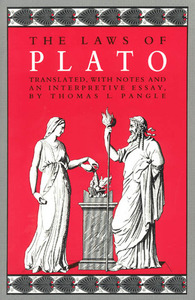You need to sign in or sign up before continuing.
Take a photo of a barcode or cover
challenging
informative
reflective
slow-paced
If you are going to read an english-language translation of The Laws, this is almost certainly the one you want. The bibliography is a bit thin, so I recommend supplementing this with "Introduction to Plato's Laws" by R. F. Stalley.
Now that that's out of the way let's all make Magnesia a good place to live, without war, retail trade, sophists, disreputable poets,inn keepers, or traffic accidents... (watch https://www.youtube.com/watch?v=MSlMgfU7LvU to understand this reference :-))
Now that that's out of the way let's all make Magnesia a good place to live, without war, retail trade, sophists, disreputable poets,inn keepers, or traffic accidents... (watch https://www.youtube.com/watch?v=MSlMgfU7LvU to understand this reference :-))
challenging
informative
reflective
slow-paced
Started reading this for a uni module, finished it in my own time, so adding it here.
As much as I appreciate Plato for trying to be a little more pragmatic (compared to the Republic, in particular) the dialogue format he uses makes reading long lists of laws unbearable. Read some of his other stuff instead, I think: this didn't even have very much impact on the history of philosophy.
As much as I appreciate Plato for trying to be a little more pragmatic (compared to the Republic, in particular) the dialogue format he uses makes reading long lists of laws unbearable. Read some of his other stuff instead, I think: this didn't even have very much impact on the history of philosophy.
challenging
informative
medium-paced
interestingly draconian and pragmatic when compared to his republic, very intriguing when thought of in that context otherwise was just a slower read thru of legal codes and structures
Very dated, almost all of it is just semantic explanations of how many drachmas to fine people for committing various crimes
Can’t stand Plato and he’s boring me,, don’t know if I can do all these books rn
challenging
slow-paced
Another weak attempt by Plato to sell the notion of totalitarianism.
It's just too bad many politicians actually try to implement these ideas.
It's just too bad many politicians actually try to implement these ideas.
informative
reflective
slow-paced
The one Plato work that makes for accessible, organised, reading
I have the greatest respect for Plato’s work and what it has meant for Western thought and Western culture. To my chagrin, Plato and the Socratic dialogues have proven rage-inducing to go through, if you are like me the sort who:
* sees an argument that looks strange
* picks it apart, because believes character is flippant
* works on refuting it for 5 minutes
* realises author is dead and can’t answer
* does a Tasmanian Devil impersonation
However, here we are dealing with a lecture, rather than a debate, which will hopefully make it easier to digest the ideas.
If not, this book might still be for you, as a coherent, comprehensive layout for main governance issues or for the mental exercise of ‘coding’ a fictional Polis from scratch. It is very rewarding.
I have the greatest respect for Plato’s work and what it has meant for Western thought and Western culture. To my chagrin, Plato and the Socratic dialogues have proven rage-inducing to go through, if you are like me the sort who:
* sees an argument that looks strange
* picks it apart, because believes character is flippant
* works on refuting it for 5 minutes
* realises author is dead and can’t answer
* does a Tasmanian Devil impersonation
However, here we are dealing with a lecture, rather than a debate, which will hopefully make it easier to digest the ideas.
If not, this book might still be for you, as a coherent, comprehensive layout for main governance issues or for the mental exercise of ‘coding’ a fictional Polis from scratch. It is very rewarding.
I literally got anxious toward the end because I thought he was about to answer the central question of the Meno (What is ‘Virtue’ (arete) as a whole; that is, what is it which is common to all virtues, such that we would say they are all Virtue) but he got around it again by saying that the Guardians of the Laws of this new city would be the ones who decided this after much intense labor and deliberation. But it’s interesting that he doesn’t say virtue comes from the gods, and is instead what is reasoned from these wisest of wise men. I think the Laws might be my favorite dialogue. It doesn’t have the most beautiful imagery, it doesn’t dwell on the more divine philosophical implications of things; Plato has already written extensively about those things in all of his other dialogues. The Laws is Plato’s last dialogue, and as such it incorporates many ideas from his previous dialogues, but doesn’t dwell on expanding them so much in the Laws. Here Plato creates a comprehensive structure in which these ideas of virtue, beauty, divinity, etc. have a place in human lives and how we order ourselves to these concepts and thus become good men, and the fact that Plato sought to undertake that task and did so in a very compelling, artful, and comprehensive way is probably the most beautiful thing Plato ever did.








